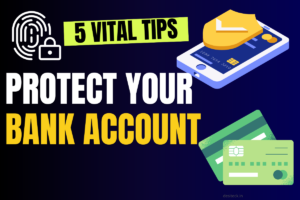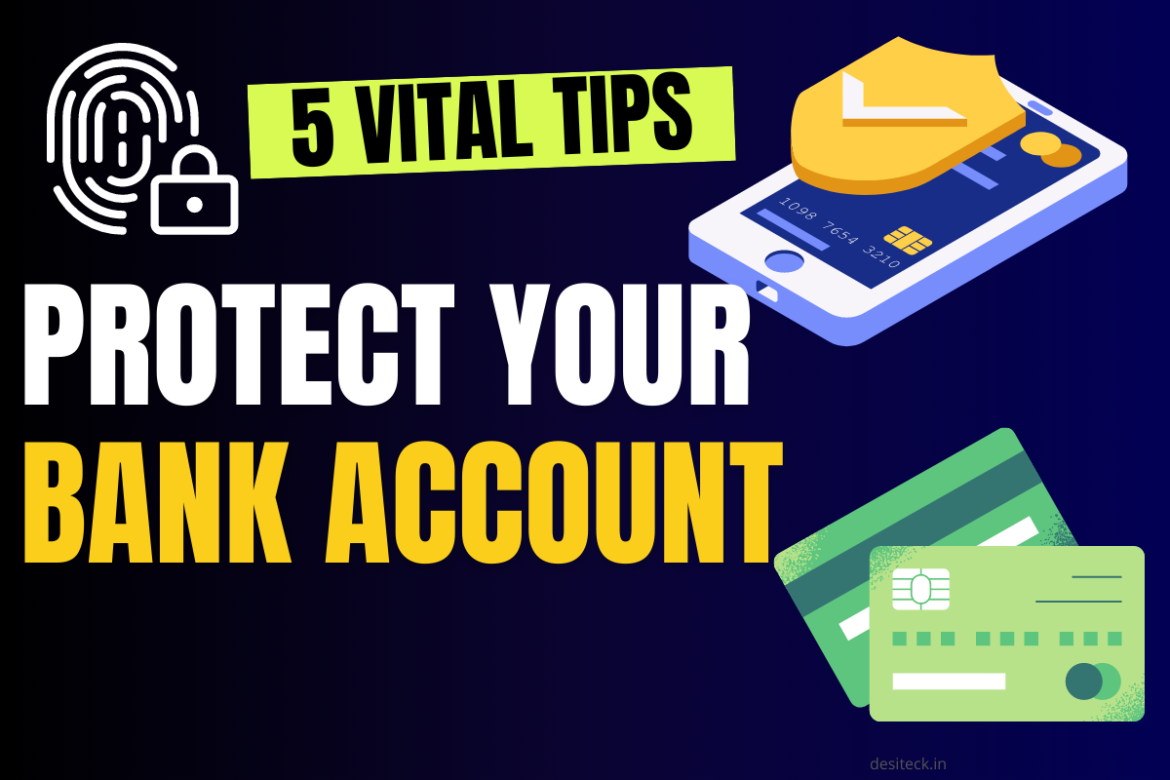In this digital age, where financial transactions are increasingly carried out online, it is crucial to safeguard your bank account from potential hacking attempts. Cybercriminals are constantly devising new ways to gain unauthorized access to sensitive financial information, making it imperative for individuals to take proactive measures to protect their hard-earned money. In this article, we will explore five vital tips that can help you secure your bank account and prevent it from getting hacked.
Table of Contents
Introduction: The Growing Threat of Bank Account Hacking
In today’s interconnected world, hackers have become increasingly sophisticated in their methods of breaching security systems and gaining unauthorized access to bank accounts. It is essential to understand the potential risks and adopt robust security practices to safeguard your financial assets.

Protect Bank Account
Strengthen Your Passwords: The First Line of Defense
One of the simplest yet most effective ways to protect your bank account is by using strong, unique passwords. Avoid common passwords such as “123456” or “password” and opt for complex combinations of letters, numbers, and special characters. Additionally, refrain from using the same password across multiple accounts to minimize the risk of a domino effect in case one account gets compromised.
Enable Two-Factor Authentication: Adding an Extra Layer of Security
Two-factor authentication (2FA) is a powerful security measure that adds an extra layer of protection to your bank account. By enabling 2FA, you not only require a password to access your account but also a unique verification code sent to your mobile device. This additional step significantly reduces the likelihood of unauthorized access, as hackers would need physical possession of your device to bypass this security feature.
Be Cautious of Phishing Attacks: Don’t Fall for Scams
Phishing attacks remain a prevalent method used by hackers to trick individuals into revealing their sensitive information. Be vigilant when responding to emails, messages, or phone calls requesting personal or financial details. Legitimate financial institutions never ask for such information through unsecured channels. Avoid clicking on suspicious links and always verify the authenticity of the communication before sharing any sensitive information.
Regularly Monitor Your Bank Account: Detecting Suspicious Activity
Frequently monitoring your bank account is essential for detecting any unusual or unauthorized activity promptly. Regularly review your account statements, transaction history, and balance to identify any discrepancies or unfamiliar transactions. If you notice any suspicious activity, report it to your bank immediately. Many banks also offer real-time notifications and alerts, enabling you to stay informed about any changes or transactions in your account.
Be Cautious of Phishing Attacks: Don’t Fall for Scams
Phishing attacks remain a prevalent method used by hackers to trick individuals into revealing their sensitive information. Be vigilant when responding to emails, messages, or phone calls requesting personal or financial details. Legitimate financial institutions never ask for such information through unsecured channels. Avoid clicking on suspicious links and always verify the authenticity of the communication before sharing any sensitive information.
Regularly Monitor Your Bank Account: Detecting Suspicious Activity
Frequent monitoring of your bank account is vital in promptly identifying any unusual or unauthorized activity. Regularly review your account statements, transaction history, and balance to spot any discrepancies or unfamiliar transactions. If you observe any suspicious activity, promptly report it to your bank. Many banks also offer real-time notifications and alerts, enabling you to stay informed about any changes or transactions transpiring in your account.
Updating Your Software: Addressing Vulnerabilities
Outdated software, including operating systems and banking applications, can create vulnerabilities that hackers exploit to gain access to your bank account. Ensure you regularly update your software to incorporate the latest security patches. Configure your devices and applications to automatically download and install updates whenever they become available. By doing so, you minimize the risk of cybercriminals capitalizing on known vulnerabilities.
Conclusion
Protecting your bank account from hacking attempts requires a proactive approach and adherence to robust security practices. By strengthening your passwords, enabling two-factor authentication, staying cautious of phishing attacks, monitoring your account regularly, and keeping your software up to date, you can significantly reduce the risk of unauthorized access to your hard-earned money. Take these vital steps today to secure your bank account and enjoy peace of mind in the digital realm.
Frequently Asked Questions (FAQs)
-
What should I do if I suspect my bank account has been hacked?
-
Can hackers bypass two-factor authentication?
-
How often should I change my passwords?
-
Are mobile banking apps secure?
-
What additional security measures can I take to protect my bank account?



